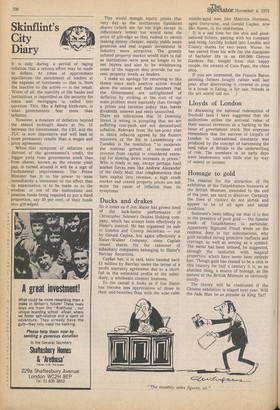Skinflint's City Diary
It is only during a period of raging inflation that a serious effort may be made ' to deflate. At times of approximate , equilibrium the enrichment of lenders at the expense of borrowers — that is, from the inactive to the active — is the result.
• Worst of all, the stability of the banks and institutions is imperilled as the security for loans and mortgages is called into question. This, like a falling birth-rate, is ' what governments fear more than inflation.
However, a measure of deflation beyond , the absurd midnight dance at No. 10 between the Government, the CBI, and the TUC is now imperative and will lead to more permanent results than a wages and price agreement.
When that symptom of inflation and distrust of the government's credit, the bigger yield from government stock than from shares, known as the reverse yield gap, is turned around it will be a sign of fundamental improvement. The Prime Minister has it in his power to issue immediately a statement to the effect that an examination is to be made as to the wisdom or not of the institutions and " pension funds being required, to put a fixed proportion, say 30 per cent, of their funds into gilt-edged.
This would mangle equity prices that very day as the institutions liquidated shares (which are far too high except in inflationary terms) but would raise the price of gilt-edge as they rushed to switch making money cheaper, equity yields more generous and real organic investment in industry more attractive. The grossly inflated property market would start to fall as institutions were seen no longer to be net buyers and also to be withdrawing some of the support they provide for current property levels as lenders.
I make no apology for returning to this theme since such positive action would show the unions and their members that the Government are unfrightened of deflation by striking at the root of our main problem more equitably than through a prices and incomes policy that leaves dividends, interest and rents untouched. There are indications that 10 Downing Street is wrong in accepting that we are suffering cost-push and not demand-pull inflation. Relevant from the ten-point plan to check inflation agreed by the finance ministers of the Six in Luxembourg on Tuesday is the resolution "to moderate the nominal growth of incomes and revenue from capital is considered essential for slowing down increases in prices." Who is ready to say, except perhaps hard market forces men like Andrew Alexander of the Daily Mail, that conglomerates that turn capital into revenue, a high stock market and crazed property prices are not more the cause of inflation than its symptoms.
Ducks and drakes
So it looks as if Jim Slater has grown tired of the lack-lustre performance of Christopher Selmes's Drakes Holding company, which has always been effectively in Slater's control. He has organised its sale to London and County Securities — run by Gerald Caplan, but again effectively a Slater/Walker Company, since Caplan issued shares for the takeover of subsidiary companies belonging to Slater's Barclay Securities.
Caplan has, it is said, been handed back £1 million by Barclay under the terms of a profit warranty agreement due to a shortfall in the estimated profits of the subsidiary, a wholesale chemist business.
To the casual it looks as if Jim Slater has become less appreciative of those in their mid-twenties t'han with the wise calm middle-aged men like Malcolm Horsman, aged thirty-snine, and Gerald Caplan, now like Slater, in his mid-forties.
It is a sad time for the able and goodnatured Selmes, parting with his company and being forcibly locked into London and County shares for two years. Worse, he has parted from his wife for the discipline of bachelor life in an £80,000 Cheyne Gardens flat, bought from that happy couple, the owners of Casa Pupo, the china shop.
If you are interested, the Francis Bacon painting Selmes bought rather well last year, after discovering it covered in soup in a house in Ealing, is for sale, friends in the art world tell me. )
Lloyds of London
In discussing the national redemption of freehold land I have suggested that the authorities utilise the notional value of their annual reversion as a backing to the issue of government stock. Not everyone remembers that t'ne success of Lloyd's of London in international insurance was produced by the concept of harnessing the land value of Britain to the underwriting of risk. The members in its early days were landowners with little else by way of assets or income.
Homage to gold
The reasons for the attraction of the exhibition of the Tutankhamen treasures at the British Museum, extended to the end of the year, are hard to discover. Certainly the lines of visitors do not shrink and appear to be of all ages and social condition.
Someone's been telling me that it is due to the presence of pure gold — the funeral mask of Tutankhamen in particular. Apparently Sigmund Freud wrote on the reasons, deep in our subconscious, why gold satisfied strong primitive instincts and cravings, as well as serving as a symbol. The metal has been imbued, he suggested, through the centuries with magical properties, which have never been entirely lost. Though gold has ceased to be a coin in this country for half a century it is, as an abstract thing, a source of homage, as the queues at the British Museum so obviously testify.
The theory will be vindicated if the Chinese exhibition is staged next year. Will the Jade Man be as popular as King Tut?








































 Previous page
Previous page